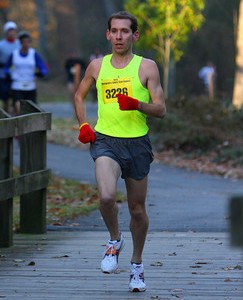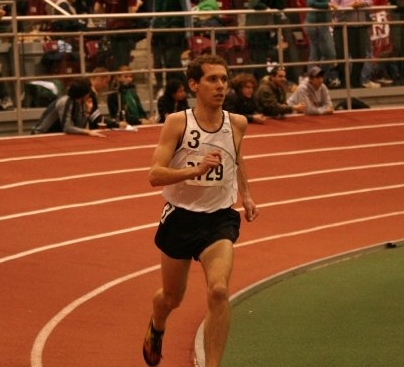Jason Fitzgerald is another long distance runner that inspires me, primarily because he is a 2:39 marathoner, which is something that I aspire to achieve. Not only is he successful in the sport, but also he is the founder of Strength Running, a popular website loaded with information on how to become a better runner.
After reading some of his posts, I knew that I definitely had to contact him and do an interview. I found his site to be very informative for runners of all levels. Jason is highly knowledgeable when it comes to running and I’m very glad that he was able to share some of that knowledge with me during our interview.
In his interview, Jason answers many burning questions about running. I get quite a few questions from readers and I like to take opportunities to share the views of other running experts, which is why I think Jason is a great fit.
YANA: What do you feel have been some of your greatest moments in running and why?
JASON FITZGERALD: I’ll have to pick my favorite race – the 2011 Philadelphia Marathon. I finished in 2:39:32, running a strong final 10k and barely slowing down at all. This race, more than any other, puts a smile on my face. I trained hard – and really smart – to improve on my inaugural marathon finish of 2:44:38 in NYC three years previously.
YANA: What do you feel is the most common mistake made by first time marathoners in either their training or their race?
JF: The biggest mistake most beginner marathoners make is not having enough patience. 26.2 miles is a long way and it takes the body a very long time to train properly to run that distance. So when I coach runners, I often see someone who is currently running about 10 miles a week with a 5 mile long run. And they want to do a marathon in 12-16 weeks!
It’s very difficult to rush a marathon so be patient and give yourself enough time to build enough fitness to tackle 26.2 miles.
YANA: I’m an advocate for a balanced training approach for runners, which means that I think runners should do a combination of cardio, strength, endurance, and flexibility training. Do you agree or disagree and why?
JF: I definitely agree, though I stay away from the word “cardio.” Running is inherently a one-dimensional form of exercise – it’s moving straight ahead in one plane of motion. It creates particular muscle weaknesses and imbalances because of this one-dimensionality.
But that’s easily countered by 15-20 minutes a day of injury prevention work that includes a dynamic warm-up and a strength workout or core routine. By focusing on the posterior chain (fancy talk for the muscles on your backside like hamstrings, glutes, and lower back) and working in all three planes of motion, runners can be significantly better athletes and prevent a lot more injuries.
YANA: When most people hear the words “core training,” they automatically think it’s just “abs.” Could you tell the readers who are reading this what exactly core training means, so that they hear it from a highly accomplished runner like yourself?
JF: Core training is definitely not just abdominal exercises! Your “core” includes everything between your knees and nipples: quadriceps, hamstrings, glutes, hips, lower and upper abs, obliques, and the lower back.
Your core is your foundation and it helps keep you stable while running, so it’s critical to develop all of the muscles that comprise the core. I highly recommend this workout, which I’ve cleverly called the Standard Core Routine.
YANA: What piece of advice do you have for runners who would like to improve their form and what are some elements of good running form?
JF: I like to keep form improvements simple because it can get complicated and a lot of runners who already have pretty good form try to fix something that isn’t broken.
So there are two things that every runner should do:
1. Land with your foot underneath your body instead of reaching out in front of the body. This cuts down on aggressive heel striking.
2. Increase your cadence to about 180 – don’t worry if you’re not right at this number, but most runners should be over 170 at least.
These two simple fixes take care of the majority of form issues.
YANA: Could you tell me more about your book, 101 Simple Ways to be a Better Runner?
JF: I was in a book store one day browsing through the running section trying to find a book that summarized all of the best training advice. I couldn’t find that book.
There are tons of books on training but none of them were quick reads – they all got into the (sometimes boring) details of ventilator threshold and lactate clearance. That stuff is important, but I wanted actionable running advice that was condensed and easy to read.
Since I couldn’t find it, I wrote it. My book, 101 Simple Ways to be a Better Runner, is an actionable list of the coaching advice and running wisdom I’ve learned over nearly 15 years of competitive running.
YANA: What piece of advice do you have for marathon runners who would like to break 3 hours?
JF: Patience! That’s no easy feat for most runners and will take years of patient training. Focus on the process.
YANA: What do you do to deal with your running injuries?
JF: I’ve been lucky that I haven’t had a significant running injury since 2009, despite running a big marathon PR and setting two annual mileage bests since then. My well-balanced approach to training – the same principles I use with the runners I coach – helps both myself and my athletes stay healthy.
But if you get injured, or start to feel something flare up, take action immediately. That doesn’t mean just rest – it means an aggressive treatment approach. Model what the elites do: rest, ice, massage (self or professional), specific rehab, targeted strength work, and appropriate cross-training.
YANA: Do you have any favorite books that you recommend for runners to read?
JF: I love reading about this subject and have a carefully curated list of running books. In particular (besides my own book!), I highly recommend Run Faster from the 5K to the Marathon
by Brad Hudson and Matt Fitzgerald.
I want to take this opportunity to thank Jason for his interview. I wish him continued success!

